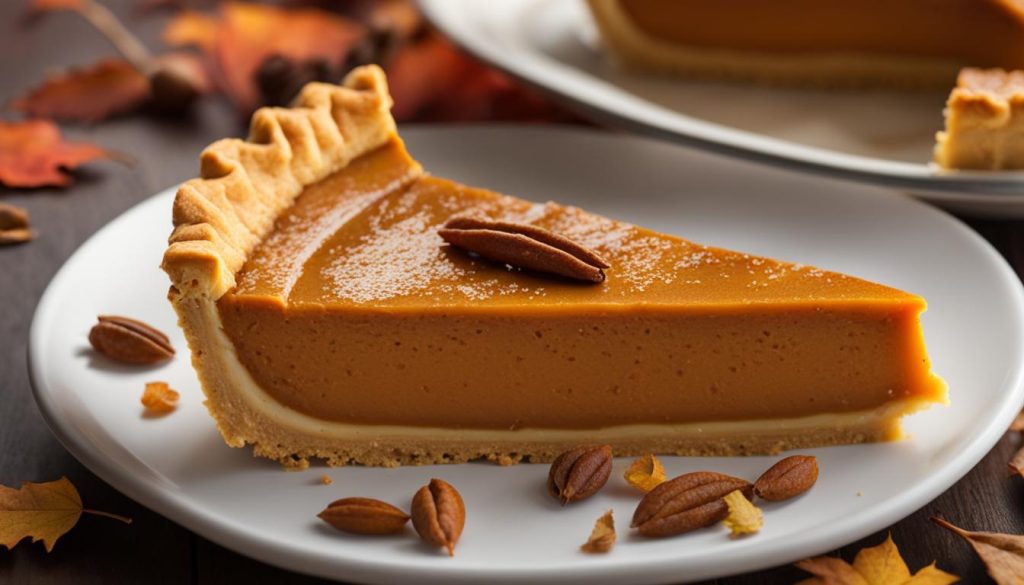When it comes to indulgent desserts, few can rival the beloved pumpkin pie. But did you know that this delicious treat also offers a plethora of health benefits? Packed with essential nutrients, pumpkin pie can be a guilt-free addition to your diet.
Before we delve into the specific nutrient facts, it’s important to note that the nutritional value of pumpkin pie can vary depending on the recipe and ingredients used. However, the following information provides a general overview of its nutrient profile.
Health Benefits of Pumpkin Pie
- Pumpkin pie is not only a delectable dessert but also offers numerous health benefits.
- It is packed with essential nutrients, including vitamins and minerals.
- The specific nutrient content can vary depending on the recipe and ingredients used.
- Pumpkin pie is a good source of vitamin A, vitamin C, and vitamin E.
- It contains antioxidants that can help fight against free radicals in the body.
Nutrient Profile of Pumpkin Pie
Pumpkin pie is a delicious dessert that not only satisfies your cravings but also provides a host of health benefits. This beloved treat is rich in essential nutrients, making it a great addition to your diet. Let’s take a closer look at the nutrient profile of pumpkin pie.
A typical serving of pumpkin pie, which is usually a slice, contains approximately 252 calories. It also provides a good balance of macronutrients, with 34 grams of carbohydrates, 9 grams of fat, and 6 grams of protein. These macronutrients contribute to the overall energy and satiety you experience after consuming pumpkin pie.
In addition to its macronutrient content, pumpkin pie is also packed with vitamins and minerals. It is a great source of vitamin A, vitamin C, and vitamin E. Vitamin A is known for its role in promoting eye health, while vitamins C and E are powerful antioxidants that support overall wellness.
Furthermore, pumpkin pie contains essential minerals such as potassium and iron. Potassium plays a crucial role in maintaining healthy blood pressure levels, while iron is vital for oxygen transport within the body, supporting optimal functioning.
By indulging in a slice of pumpkin pie, you can enjoy its delicious taste while reaping the benefits of its nutrient-rich profile. Incorporating pumpkin pie into your diet can support your overall health and well-being.
Now that we have explored the nutrient profile of pumpkin pie, let’s delve further into its specific health benefits in the next section.
Vitamin A: Promoting Eye and Skin Health
Pumpkin pie is loaded with the essential nutrient vitamin A, which plays a crucial role in maintaining healthy eyesight and promoting skin health. Vitamin A is known for its ability to protect the eyes against age-related macular degeneration, a common eye condition that can lead to vision loss. By including pumpkin pie in your diet, you can give your eyes the support they need for optimal health.
In addition to its eye benefits, vitamin A also contributes to healthy skin. This nutrient is involved in the production of collagen, a protein that helps keep the skin firm and elastic. Consuming pumpkin pie regularly can help nourish your skin from within, giving it a radiant and youthful appearance.
Pumpkin pie is not only a delicious treat, but it also offers valuable vitamins and minerals that promote overall well-being. In particular, the vitamin A content in pumpkin pie makes it a standout dessert choice for supporting eye and skin health. So go ahead and enjoy a slice of pumpkin pie guilt-free, knowing that you’re treating your body to a nutrient-packed dessert!
Antioxidants: Fighting Free Radicals
When it comes to pumpkin pie, not only do you get to indulge in a delicious dessert, but you also reap the benefits of its antioxidant properties. Pumpkin pie is packed with antioxidants, including beta-carotene and other carotenoids, which play a vital role in fighting against free radicals in the body.
These antioxidants help reduce the risk of chronic diseases, such as heart disease and cancer, by neutralizing harmful free radicals. By including pumpkin pie in your diet, you can give your body the support it needs to maintain overall health and well-being.
In addition to its antioxidant content, pumpkin pie is also a good source of dietary fiber. Fiber is essential for digestion and promotes gut health. With each delicious slice of pumpkin pie, you’re not only satisfying your sweet tooth, but you’re also giving your body the fiber it needs for optimal digestive function.
- Antioxidants like beta-carotene and carotenoids fight against harmful free radicals.
- Pumpkin pie helps reduce the risk of chronic diseases, including heart disease and cancer.
- The dietary fiber in pumpkin pie supports digestion and promotes gut health.
Immune Boosting Properties
The ingredients in pumpkin pie, such as pumpkin puree and spices like cinnamon and ginger, have immune-boosting properties. Pumpkins are packed with vitamins and minerals that support a healthy immune system. The rich orange color of pumpkin indicates the presence of beta-carotene, which is converted to vitamin A in the body. Vitamin A plays a crucial role in the production of white blood cells, which are essential for fighting off infections and diseases.
Furthermore, pumpkin pie is a good source of vitamin C, another key nutrient for immune health. Vitamin C is known to stimulate the production of antibodies and enhance the function of white blood cells, making it effective in protecting the body against harmful pathogens. Enjoying a slice of pumpkin pie can provide a tasty and nutritious way to boost your immune system.
In addition to vitamins, pumpkin pie also contains dietary fiber. Fiber plays a vital role in supporting a healthy digestive system. A strong gut health is closely linked to an optimal immune response. Fiber helps to maintain a balanced gut microbiome, which in turn helps to strengthen the immune system and ward off infections. So, indulging in pumpkin pie not only satisfies your sweet tooth but also supports your overall immune health.

- Approximately 252 calories per slice
- 34 grams of carbohydrates
- 9 grams of fat
- 6 grams of protein
- Rich in vitamins A and C
- Good source of dietary fiber
Heart Health Benefits
When it comes to pumpkin pie, the benefits extend beyond just satisfying your taste buds. This delicious dessert can actually contribute to heart health thanks to its nutrient content. Let’s take a closer look at how pumpkin pie can support a healthy heart.
1. High in Fiber
Pumpkin pie is rich in fiber, which plays a crucial role in maintaining heart health. A diet high in fiber can help lower cholesterol levels, reducing the risk of heart disease. Fiber also promotes satiety, helping to control appetite and manage weight, another important factor in heart health.
2. Good Source of Potassium
In addition to its fiber content, pumpkin pie also contains an important mineral: potassium. Potassium helps regulate blood pressure levels, supporting overall cardiovascular health. Maintaining a healthy blood pressure is essential for reducing the risk of heart disease and stroke.
To enjoy the heart health benefits of pumpkin pie, why not try making your own homemade version? This allows you to control the ingredients and ensure the pie is made with wholesome, nutritious components.
With its high fiber content and potassium presence, homemade pumpkin pie can be a heart-healthy dessert option. So go ahead, indulge in a slice of this delectable treat while caring for your heart!
Do you want to learn more about the nutritional value and ingredients of pumpkin pie? Keep reading the next section!
Weight Management Support
When it comes to managing weight, dessert usually isn’t the first thing that comes to mind. However, pumpkin pie can actually be a smart choice if you’re watching your waistline. While moderation is key, incorporating pumpkin pie into a balanced diet can be a guilt-free indulgence.
Pumpkin pie is made with pumpkin pie filling, which typically consists of pumpkin puree, eggs, sweetener, and spices. This easy pumpkin pie recipe can be prepared with a homemade crust or a store-bought one, depending on your preference. The crust adds a delicious texture and complements the creamy pumpkin pie filling.
One of the reasons why pumpkin pie can support weight management is its fiber content. Fiber is known to promote feelings of fullness, making it easier to control portion sizes and resist overeating. A slice of pumpkin pie can help satisfy your dessert cravings while keeping you satisfied for longer.
But how many calories are in a slice of pumpkin pie? On average, a slice of pumpkin pie contains about 252 calories. Compared to other calorie-dense desserts, pumpkin pie is relatively low in calories. This means you can indulge in a slice without feeling guilty or derailing your weight management efforts.

Conclusion
Pumpkin pie is not only a delicious treat but also offers a multitude of health benefits. From promoting eye and skin health to providing immune-boosting antioxidants, it’s no wonder why pumpkin pie is a popular dessert choice. However, it’s important to enjoy pumpkin pie in moderation as part of a balanced diet.
Whether you prefer a classic recipe or want to experiment with different flavors and spices, pumpkin pie can be a fantastic addition to your dessert repertoire. Its nutrient profile, including vitamins A and C, fiber, and antioxidants, makes it a standout choice for those seeking a tasty and nutritious dessert option.
So, when you’re looking for a dessert that not only satisfies your sweet tooth but also provides health benefits, consider indulging in a slice of pumpkin pie. Whether it’s the best pumpkin pie or a unique twist with pumpkin pie spice, this classic dessert is sure to please your taste buds and nourish your body.
FAQ
What are the health benefits of pumpkin pie?
Pumpkin pie offers numerous health benefits. It is packed with essential nutrients, such as vitamins A, C, and E, as well as minerals like potassium and iron. It also contains antioxidants and dietary fiber, which promote overall health and well-being.
How many calories are in a slice of pumpkin pie?
A typical slice of pumpkin pie contains approximately 252 calories.
Is pumpkin pie high in carbohydrates?
Yes, pumpkin pie has a relatively high carbohydrate content, with around 34 grams per slice.
What vitamins does pumpkin pie provide?
Pumpkin pie is rich in vitamins A, C, and E, which are important for various bodily functions, including eye health, immune function, and skin health.
Does pumpkin pie contain antioxidants?
Yes, pumpkin pie contains antioxidants, such as beta-carotene and other carotenoids, which help fight against free radicals and reduce the risk of chronic diseases.
Can pumpkin pie boost the immune system?
Yes, the ingredients in pumpkin pie, including pumpkin puree and spices like cinnamon and ginger, have immune-boosting properties. Pumpkin pie is rich in vitamins A and C, which strengthen the immune system and help fight off infections.
Does pumpkin pie support heart health?
Yes, pumpkin pie can contribute to heart health. The high fiber content in pumpkin pie can help lower cholesterol levels and reduce the risk of heart disease. It also contains potassium, which is important for maintaining a healthy blood pressure.
Can pumpkin pie help with weight management?
Pumpkin pie can be a part of a balanced diet when enjoyed in moderation. The fiber in pumpkin pie promotes feelings of fullness, which can help with managing weight. Additionally, pumpkin pie is relatively low in calories compared to other desserts.
Is homemade pumpkin pie a healthier option?
Homemade pumpkin pie allows you to control the ingredients used, which can make it a healthier option compared to store-bought versions that may contain additional additives or high levels of sugar. However, portion sizes and overall balance in the diet are key for maintaining a healthy lifestyle.




